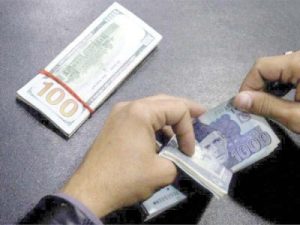Pakistan is in financial trouble.
Business leaders call on the SBP and government to revamp market rules and strengthen the currency.

KARACHI: According to the Pakistan Business Forum (PBF), the ongoing depreciation of the currency is exacerbating the nation’s economic crisis. The PBF leaders urged the State Bank of Pakistan (SBP) to take the necessary steps to stop market speculation and find a solution.
The much-anticipated International Monetary Fund (IMF) Programme has resumed, but Pakistan’s economy is still in freefall, according to a statement made on Monday by PBF CEO Ahmad Jawad. To ease the suffering of traders and save the industries, Finance Minister Ishaq Dar must reveal a clear rupee policy.
“Despite the fact that the business community continues to be plagued by high inflation, unemployment, and low profitability, the government has withdrawn the electricity concession it had granted to exporters, and it is anticipated that the tax on gasoline and diesel will rise to Rs50 per litre by January 2023. The administration is also considering adopting GST, which would only make their plight worse. These are all bad signs for the national economy, he continued.
Even the bond and currency markets, which had more faith in Pakistan following the IMF agreement, are pricing in high once more because to worries that Pakistan may stop paying its foreign debt, according to Jawad.
The currency is one of the worst performing in Asia, and yields on some of the government’s overseas bonds have increased by a third since the end of August, according to the statement.
Is it not disgraceful for Pakistan that we celebrate repaying the $1 billion Sukuk yet do nothing to prevent the money we are wasting from being wasted? Saving $3.5 billion by using daylight, according to the PBF CEO.
“We still owe $130 billion in foreign debt, with $73 billion of that coming due in three years. Our deficit is expected to be between $20 and $30 billion during the next three years. Additionally, the poor are being wiped out by extreme inflation. A financial emergency exists, regretted Jawad.
According to Muhammad Arsalan Siddiqui, head of research at Optimus Capital, speaking to the Express Tribune, “the main challenge right now is to arrange external funding to meet foreign outflows at a time when the SBP reserves are around $7 billion with an import cover of only 1.1 months versus the minimum required standard of three months.”
He added that while the government was only able to get $0.2 billion from July to October 2022 while the foreign commercial loans were aimed at $7.7 billion for FY 2023, “The Chinese deposit rollover of $4 billion is still outstanding.”
The international Sukuk and Eurobond market, which had a $2 billion aim, cannot be reached, according to Siddiqui, because of the current high yields.
“Finally, the IMF’s Ninth review is still pending, which is essential for the release of $1 billion and will make it easier to secure further assistance from other multilateral and bilateral lenders. But for the time being, these uncertainties are placing tremendous pressure on the currency and FX reserves, he said.
The PBF CEO added that the government has failed to meet its goals for tax collections, industrial production, and other metrics. He bemoaned that “all the figures have gone wild.”
Despite this, Jawad said, “PBF does believe that the real effective exchange rate (REER) of the dollar against the rupee is less than Rs200 for a dollar and that the current depreciation cycle is a direct result of speculative trading, a lack of regulatory oversight, and improper management of the forex market.
Tahir Abbas, the head of research at Arif Habib Limited, stated to The Express Tribune that the currency regime should be decided by the market because the IMF’s ninth review is still pending and negotiations are still going on. Only when inappropriate behaviour is seen in the market should the SBP interfere.
Additionally, Abbas advised the government to concentrate on bringing in dollars, notably through exports and remittances, in order to reduce the current account deficit.
During the previous 50 years that his family has been in business, industrialist Muhammad Raza of Karachi’s SITE Industrial Area said to The Express Tribune, “Never has my father witnessed this amount of instability and fluctuation in the money market, or this much instability in the political sector.”
I’ve worked for 27 years, but I’ve never seen such degeneration. How can anyone invest money in such a volatile market? Raza questioned, adding, “We are really concerned.”
Jahanara Wattoo, vice president of the PBF, also urged the government to revive the economy, saying that “companies can only bear so much in the way of rising costs and increased taxation pressure.”
The cost of this year’s terrible floods will be in the tens of billions of dollars, and Pakistan has major, long-term structural economic issues. For a nation that is already deeply indebted, pleading for an IMF bailout, and appealing for financial support from the international community, Wattoo continued, it will be hard to rebuild the wrecked infrastructure.
Farazur Rehman, president of the Korangi Association of Trade and Industry (KATI), proposed that the government interact with the business community to jointly determine a path toward improved economic solutions.










































